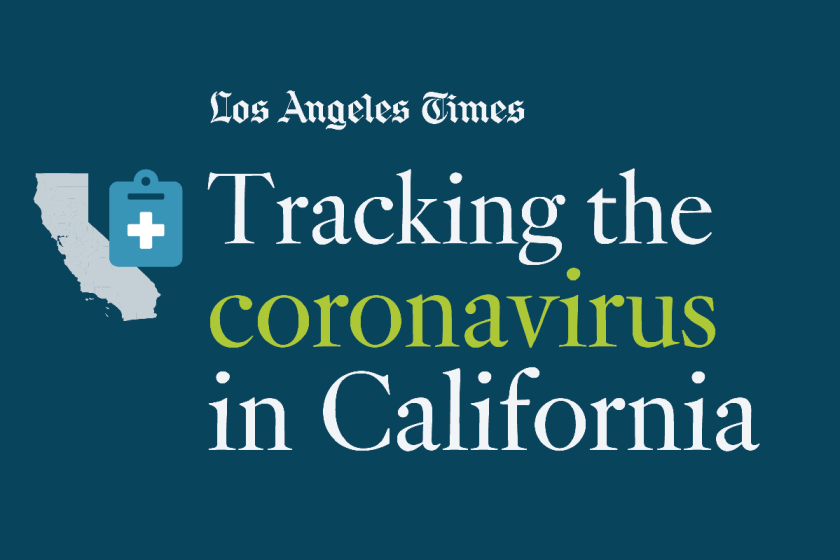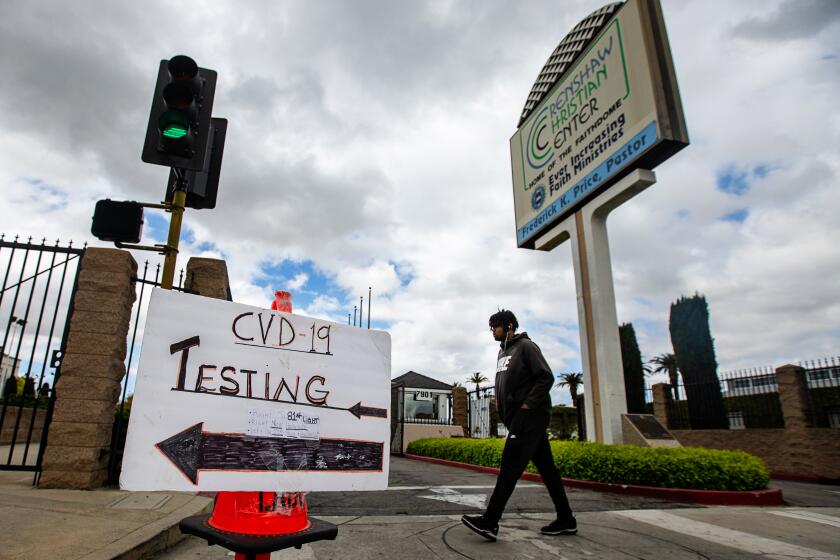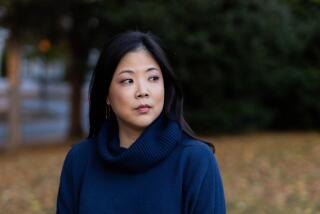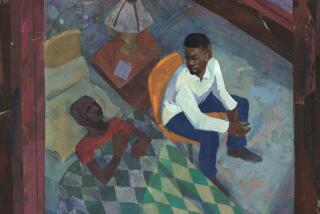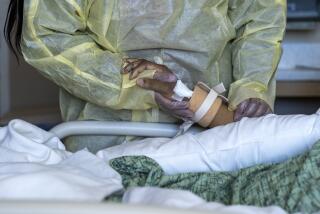Chanell Jackson rubbed sanitizing gel on her hands and pulled a protective gown over her clothes as she had done so many times before.
As a nurse, she did this ritual to help deliver wailing babies and to wheel worried women into surgery.
But this was different. This was her father.
It was Sunday, March 29. It had been 22 days since he had returned home from a ski trip in Idaho, 14 days since he had checked into Chanell’s West Los Angeles hospital with shortness of breath, and eight days since his coronavirus test had come back positive.
She carefully pressed the edges of an N95 mask until it molded to her face and affixed a plastic shield to her forehead. Then Chanell slipped a pair of gloves over her hands. And another for added protection.
Charles “Chuck” Jackson lay in the hospital bed, sedated and hooked to a ventilator cranked to the max, forcing air into his stiff lungs. Father and daughter had been in the same building for days, but unable to see each other. Now, they were finally in the same room. She could touch him, but couldn’t feel the warmth of his skin through her gloves.
The latest maps and charts on the spread of COVID-19 in California.
Chanell told her father the grim prognosis even though he was sedated and she was unsure if he could hear her. Doctors wanted Chanell and her brother, Nick, to take him off life support.
She was there to say goodbye.
Up until then, Nick had chronicled every heartbreaking development on social media. With each post and every share, he hoped to raise awareness, to dispel the myth that black people were somehow immune to the coronavirus when few knew that they getting sick and dying from COVID-19 in disproportionate numbers.
He hoped people might see his father’s face and see their own or the face of one of their relatives in need of protection. He had hoped his story would not become theirs.
“I won’t want somebody in this position,” he said.
The beeping of machines filled the ICU as Chanell searched for signs of life — a flutter of an eyelash or a wiggle of a finger. She saw none.
But she knew that her 64-year-old dad was a fighter. He had pulled a 300-pound tuna from the Gulf of Mexico, guarded schools in L.A.’s toughest neighborhoods during the city’s most violent era, and crisscrossed the world to ski down steep slopes.
“You’ve lived your life,” she recounted later. “You’ve raised us well. If you’re finished here, then you can go in peace.”
::
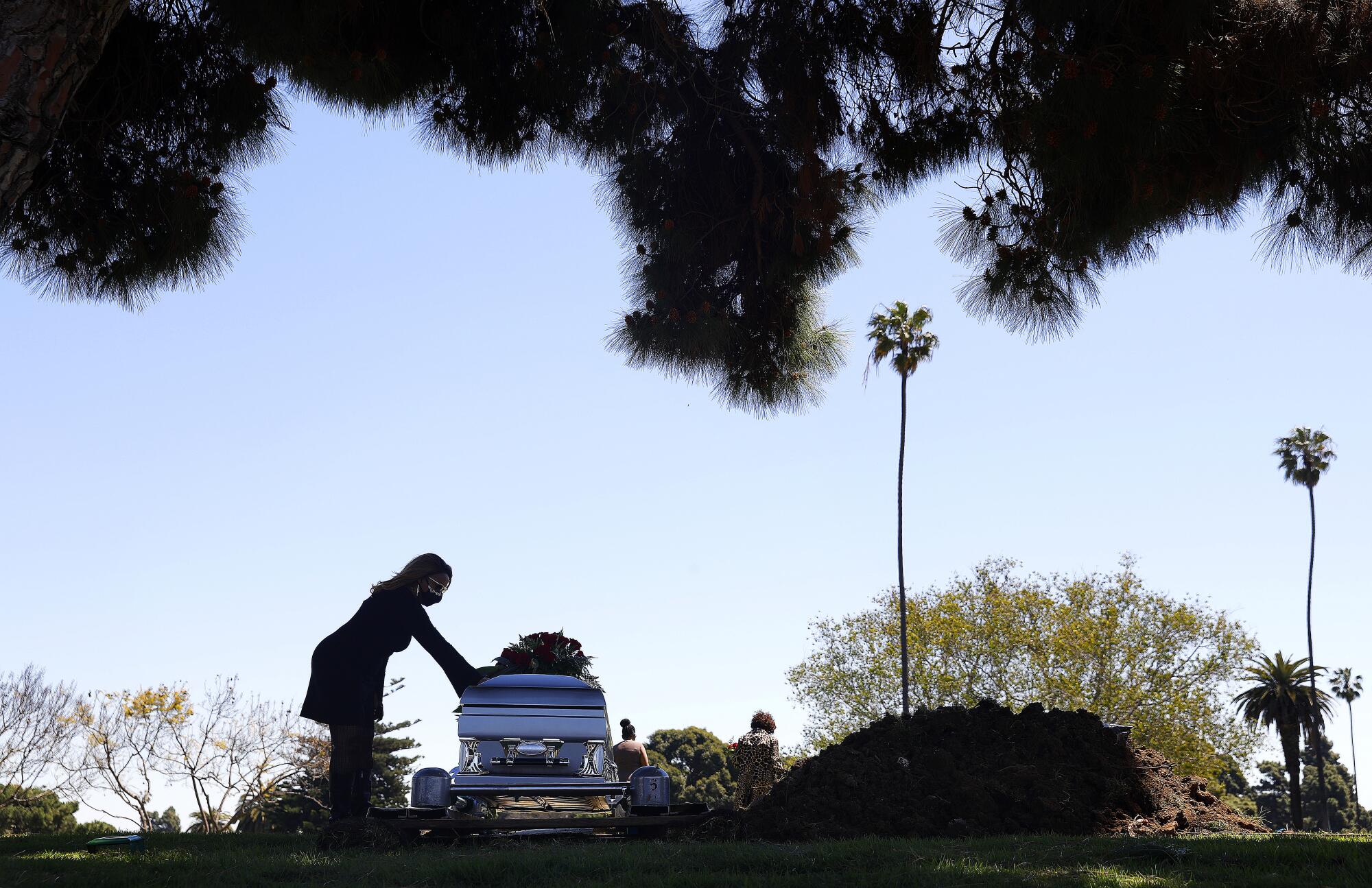
Chuck Jackson rarely missed a trip.
Though a bad back kept him off the slopes in recent years, he always made the annual pilgrimage with the National Brotherhood of Skiers. So, in late February, Chuck and more than 600 black skiers gathered on the mountain town of Ketchum, Idaho, and neighboring Sun Valley for a week of fun.
The Brotherhood, the world’s largest association of black men and women skiers and snowboarders, had much to celebrate.
Coronavirus: L.A. releases first racial breakdown of fatalities; African Americans have higher death rate
Twice its members had unsuccessfully submitted the names of their founders, Art Clay and Ben Finley, to be inducted in the U.S. Ski and Snowboard Hall of Fame. The third time was the charm.
They danced in the streets, parading into the center of Ketchum as music blared. Each ski club, from the Pasadena SnowBusters to the UK Nubians, donned matching parkas announcing each person’s alliance to their club.
A DJ shouted out the names of the dozens of black ski clubs. The party continued inside Whiskey Jacques bar, where DJ Jazzy Jeff spun records late into the night. Meanwhile, the coronavirus was silently creeping into communities across the country and showed up in Ketchum like an uninvited guest.
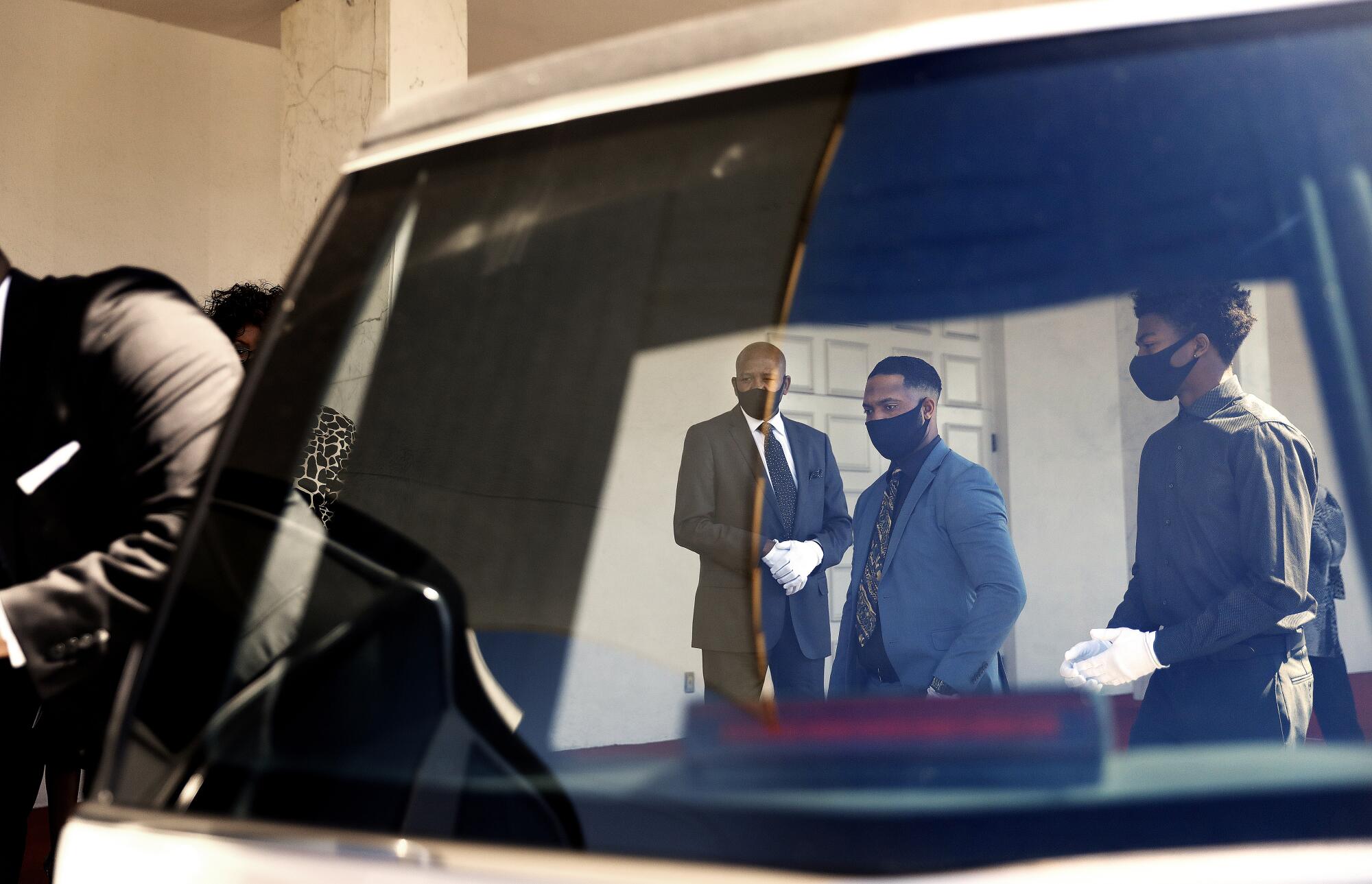
After the trip, about 130 people who returned to their respective cities got sick. At least nine of them tested positive for the novel coronavirus. And at least four from California died, including Chuck and two others in the Los Angeles area.
“I feel like I’m in a nightmare,” said Gale Frazier, president of the Blade Runner Ski Club, an affiliate of the Brotherhood. “I can’t believe it. It still don’t feel real to me.”
Frazier’s friendship with Chuck spanned years and continents. They met 15 years ago on a ski club excursion in Paris. Their bond grew over other group trips to music festivals, Brazil and the Caribbean. They had a mutual love of skiing and a dedication to build up the next generation of black skiers.
Chuck would whisk a truck full of youngsters up to Big Bear, Mountain High and at resorts in Lake Tahoe. He was dependable and happy to fill in the gaps when money ran short so the kids could have a good time, Frazier said. It was all part of the larger mission of the 47-year-old National Brotherhood of Skiers.
When Frazier and Chuck landed in Boise on Feb. 29 for the weeklong ski trip, they rented the biggest vehicle available — a Chevy Tahoe. Chuck spent the trip chauffeuring his friends back and forth to the mountains.
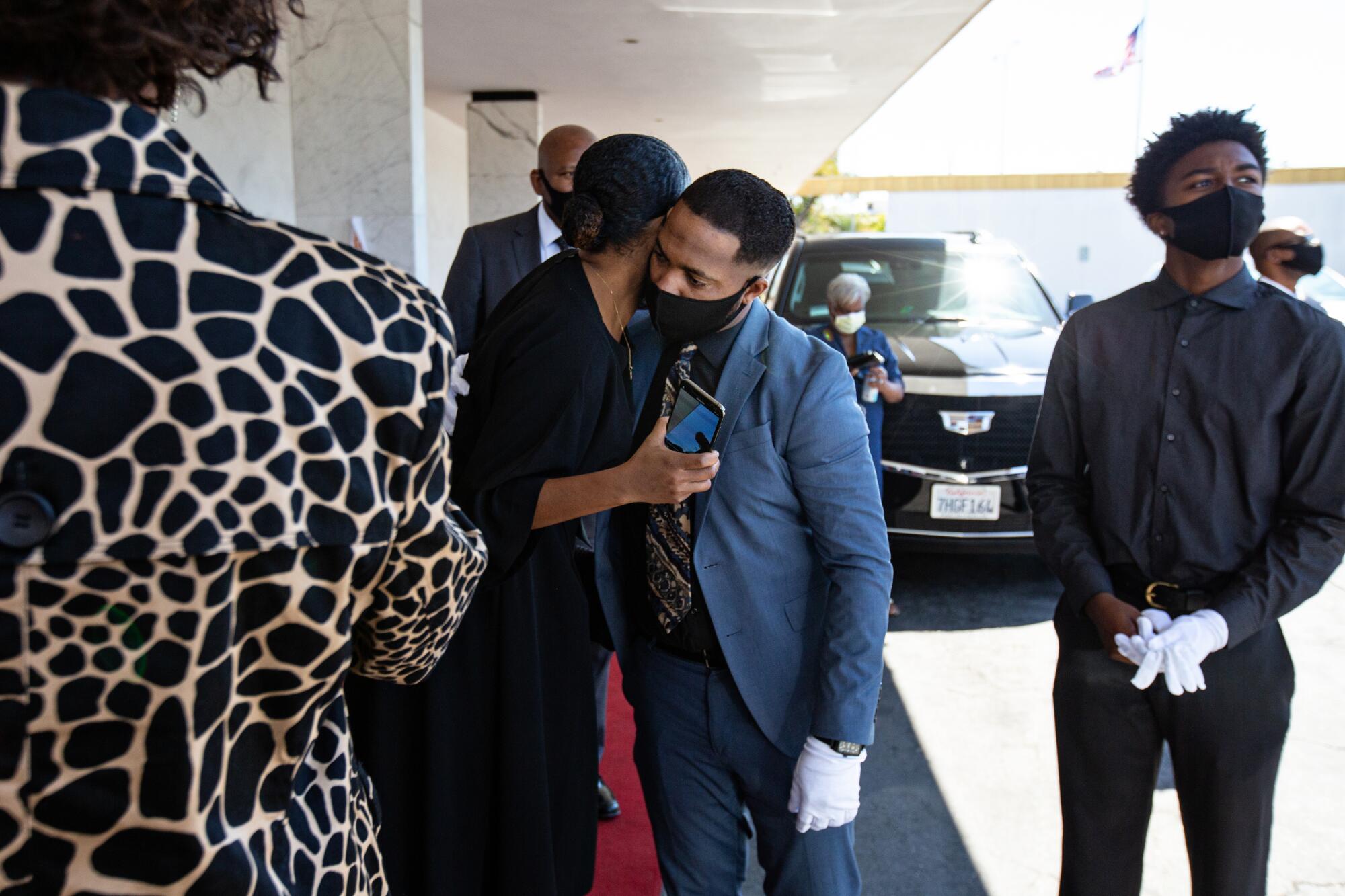
He shared a condo with Curtis McClendon and Nate Jackson, two other members of the Blade Runners Ski Club.
Members of four California ski clubs — Winter Fox, SnowBusters, Blade Runners, and Fire and Ice — attended every happy hour together. Even though Chuck didn’t drink, they laughed together at comedy shows and dined on the mountaintop.
“He didn’t miss a party,” Frazier said. “It was so much fun to see everybody in so much laughter.”
Nick picked up his father at the airport on a Saturday, March 7. By Monday, Chuck was complaining of feeling lightheaded and nauseous. He called in sick to his security job.
His daughter Chanell was visiting North Carolina with her 17-year-old son who was shooting a TV pilot. She asked her father if he would be willing to move out east with her son if the show was picked up by a network. The location was perfect, as it was on the water where Chuck could go fishing.
He told her that he wasn’t feeling well.
“I hope you don’t have coronavirus,” she remembered telling him.
“Chanell, don’t joke like that,” he told her. “Because I have never felt this way in my whole life.”
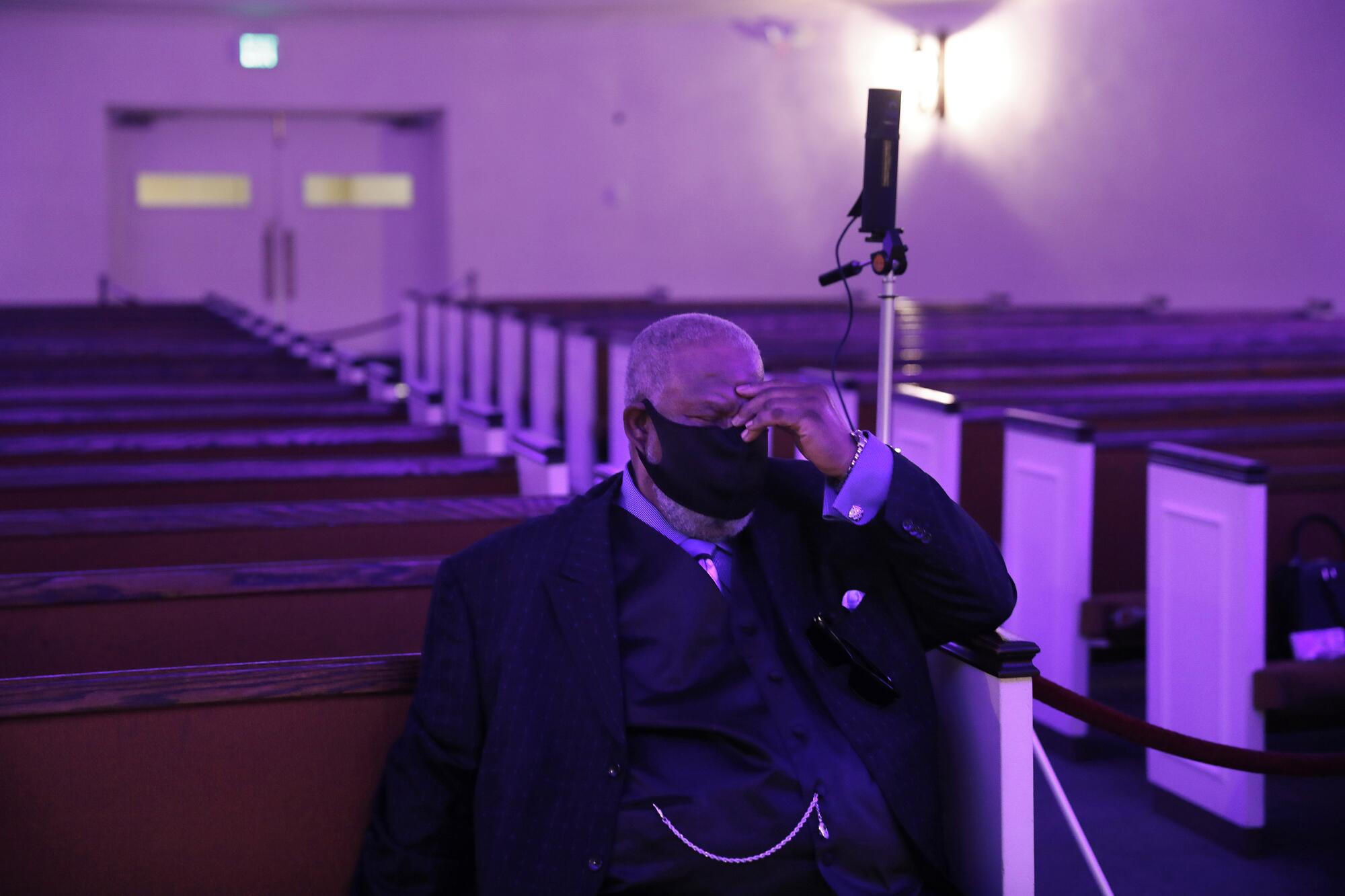
On Tuesday, he told Chanell that he was catching a cold. The next day, he had a fever, but offered to pick her up from the airport anyway.
Then on Friday, he sent a text that stopped her in her tracks.
“Call me please!!!!”
He told her he couldn’t keep food down. He sounded winded like he was running on the treadmill and talking on the phone at the same time, but he was lying in bed in his South L.A. home.
At this point, Chanell went into nurse mode. She ran down all her dad’s symptoms: shortness of breath, recent travel, fever. She urged him to see a doctor.
He just needed a little rest, he told her. He went to bed and woke up Saturday craving a steak.
“I felt like he must be fine if he could eat a steak,” Chanell recounted. “That was my thought process. He’s OK. He doesn’t have coronavirus.”
Then on Sunday, March 15, Chanell was at the Kaiser Permanente West Los Angeles campus, learning the new protocol on how to handle suspected coronavirus patients, when she received another unsettling text. His friend was checking her dad into her hospital.
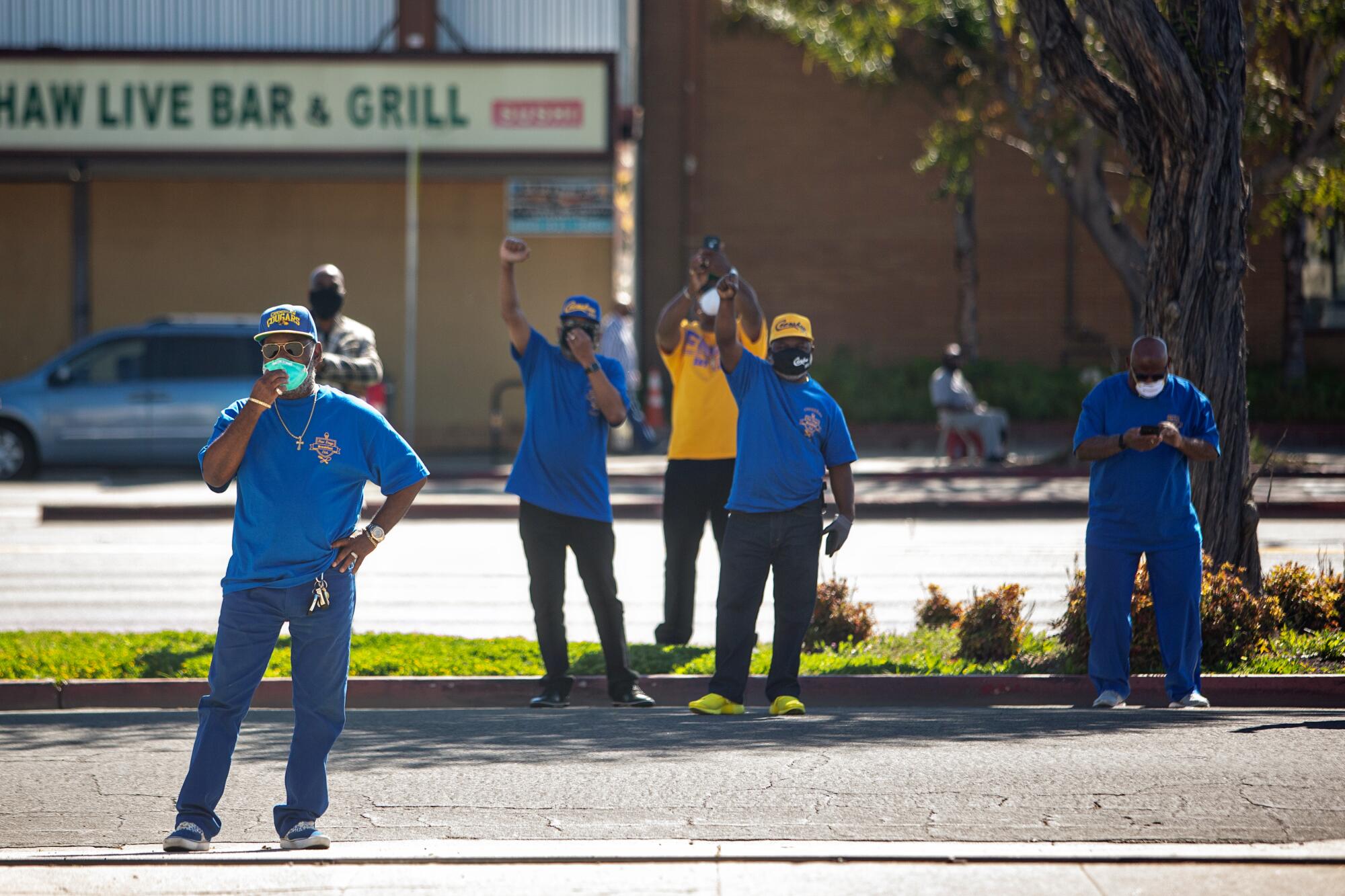
He was admitted to the emergency room and diagnosed with pneumonia in one lung. He was breathing on his own and his vitals looked good. They swabbed his nose.
He was in isolation on the fifth floor. She cared for patients on the fourth floor.
They talked by phone throughout the day. But by his second day in the hospital — Tuesday, March 17 — it was hard for him to breathe and talk at the same time.
Meanwhile, Nate Jackson, one of his roommates on the ski trip, was in a different hospital in Southern California. Chuck, squeezing the words out, said Nate had tested positive for the coronavirus and had COVID-19, he told his daughter.
Chanell could tell he was scared.
“Dad, you just got to pray,” she said. “It doesn’t matter if you have it or not. You can get better.”
But Chuck Jackson’s condition just kept getting worse.
By Saturday, March 21 — his sixth day in the hospital — the test he was given for the coronavirus came back positive. The following night, the doctors started him on an experimental drug, remdesivir. Over the course of the next week, his lung collapsed and his organs began to fail.
On Sunday, March 29, the doctors gave Chanell and Nick a choice that really wasn’t a choice.
Chanell knew he was in bad shape. But it was her daddy. The siblings decided to go with their hearts and keep him on life support. Chanell said her goodbyes.
Two days later, on Tuesday, March 31, they convinced the doctors to let Nick sit with his father one last time.
A few hours after that, Chuck died. He had been in the hospital for 16 days.
“I think he was waiting for my brother,” Chanell said.
::
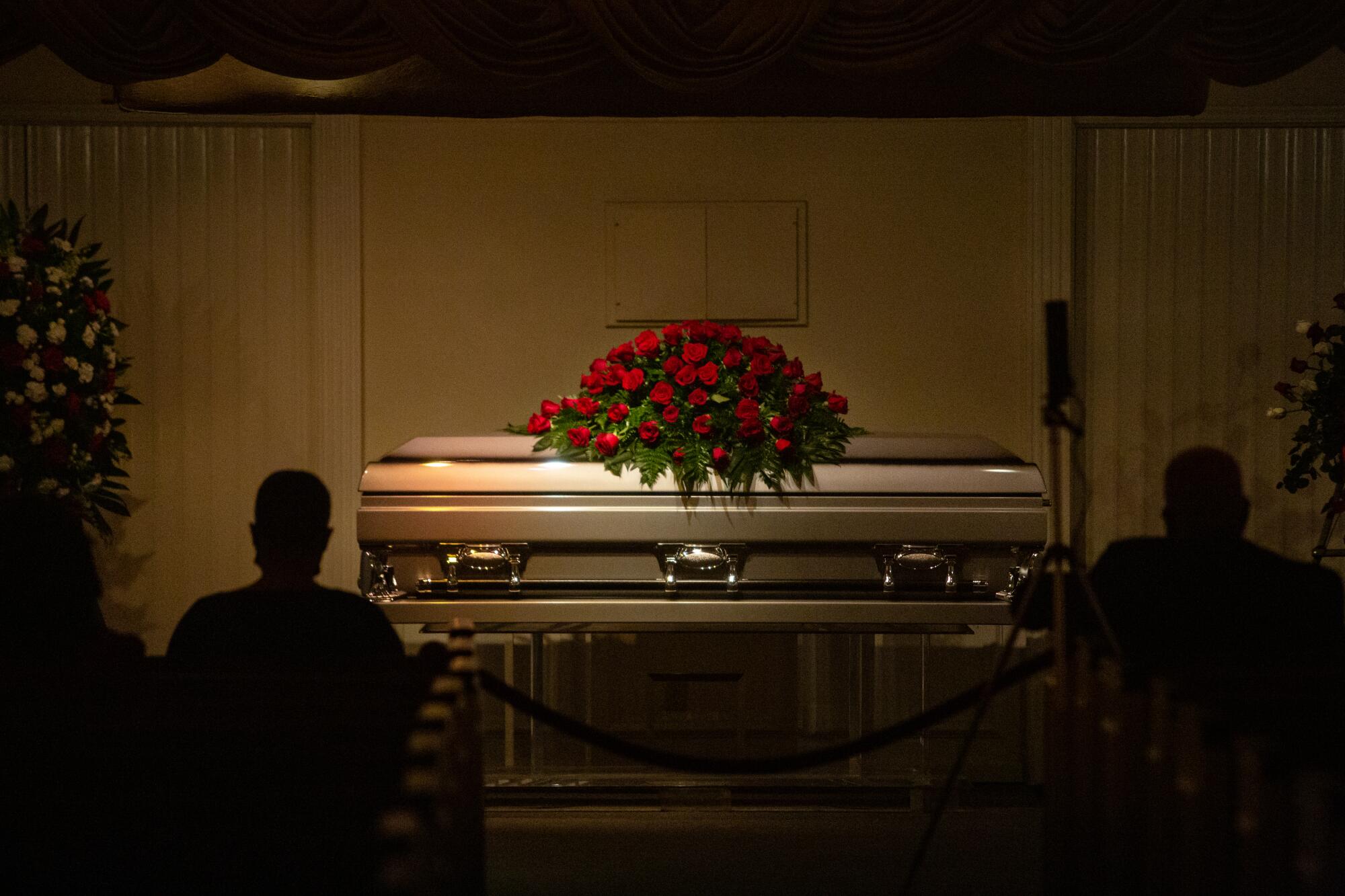
That trip still haunts members of the Brotherhood. Like in other mountain towns across the country, some year-round residents have blamed visiting skiers and snowboarders for bringing the coronavirus with them and causing an outbreak.
In Ketchum and Sun Valley, the group’s then-president, Peggie Allen, and the mayors of the two cities say otherwise.
“There is no evidence as to when and how the virus first entered Sun Valley or Ketchum,” they said in a joint statement last month.
In the end, the coronavirus claimed the life of Nate Jackson, 76, of Altadena on March 29. Charles Jackson, 64, died two days later on March 31. An 81-year-old woman of Upland lost her battle two days after that on April 2. And Haymon Jahi, 71, of San Jose died on April 9.
Finley, the co-founder of the Brotherhood who is due to be inducted in the U.S. Ski and Snowboard Hall of Fame, even spent three days in the ICU at UCLA Medical Center battling the virus.
“There’s a certain amount of guilt,” Finley, 81, said. “Four people died. It gets to you. You wonder, ‘How did I get out of this unscathed?’”
Frazier, who never got sick, but whose doctors said she’s probably asymptomatic, is perplexed how this invisible beast took down her friends. They were all in good health and active.
“What happened?” The question keeps her up at night.
::
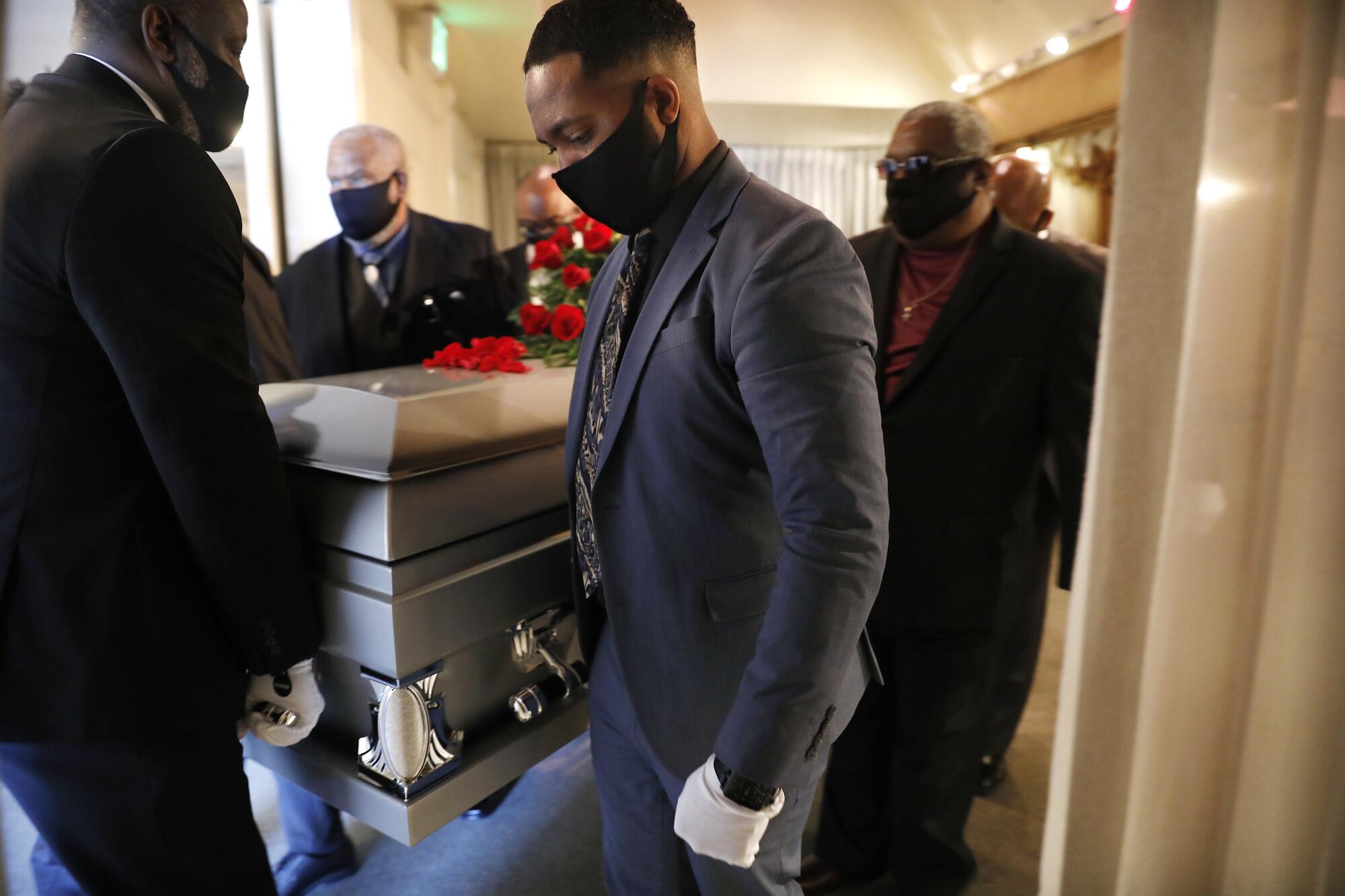
Chuck Jackson’s closest relatives gathered outside Angelus Funeral Home in South L.A. last Wednesday under a cloudless, blue sky. Black cloth masks covered their faces.
Shortly after 10 a.m., they walked single file into the building, six feet apart, one at a time.
Then, more than a dozen men emerged from their cars. Several of them donned yellow or blue Crenshaw High School shirts and masks on their faces. They were the classes of ’72 and ’73 and they came to see their buddy off.
The chapel could hold 250. Only 10 people sat in the pews. Another 300 people watched online.
“We can’t go in, but we can be here,” Melroy Green shouted from six feet away.
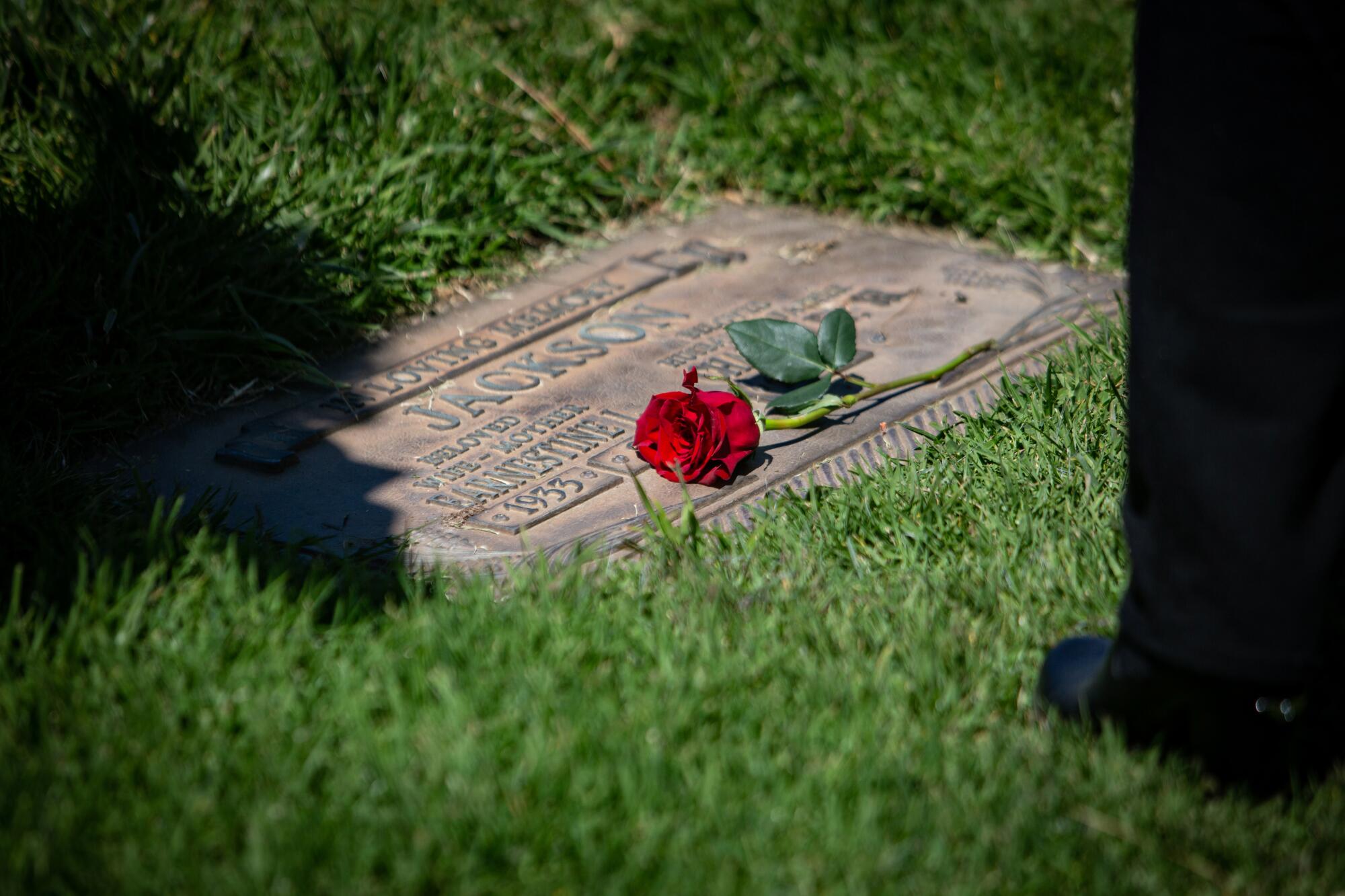
More to Read
Start your day right
Sign up for Essential California for news, features and recommendations from the L.A. Times and beyond in your inbox six days a week.
You may occasionally receive promotional content from the Los Angeles Times.
